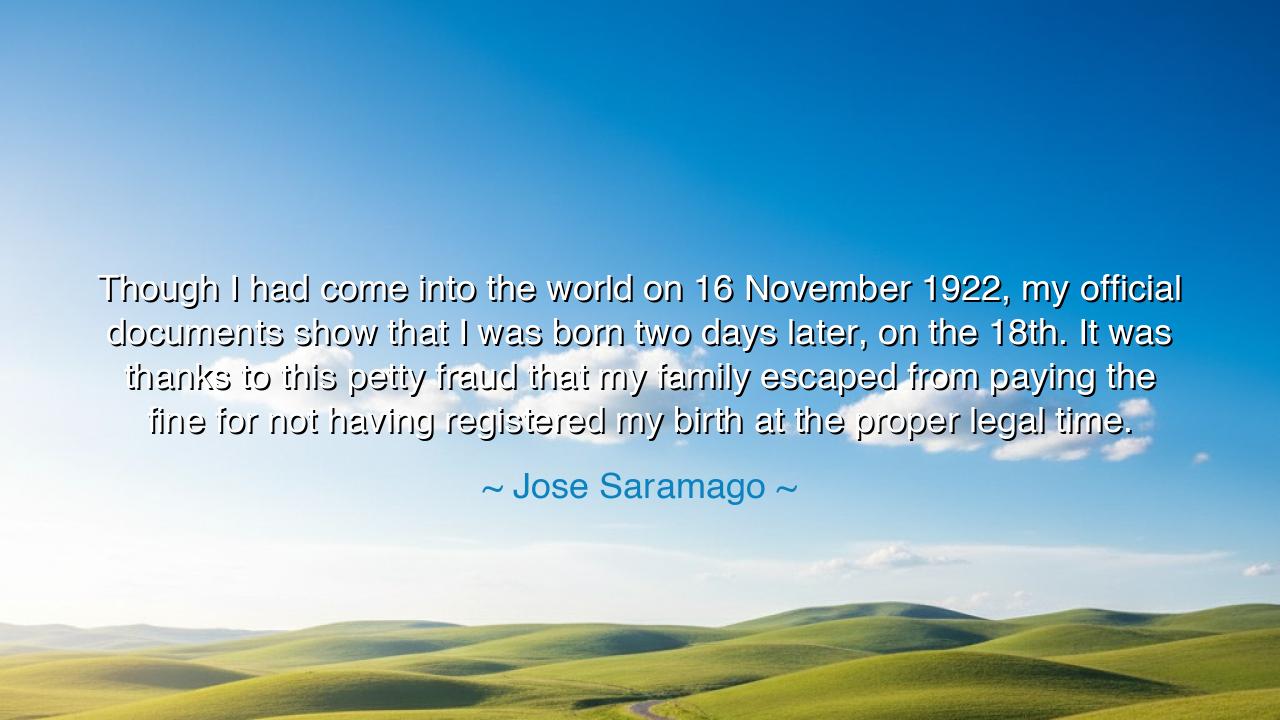
Though I had come into the world on 16 November 1922, my official
Though I had come into the world on 16 November 1922, my official documents show that I was born two days later, on the 18th. It was thanks to this petty fraud that my family escaped from paying the fine for not having registered my birth at the proper legal time.






Hearken, O seekers of wisdom, to the words of José Saramago, who reflected upon the strange and delicate dance between truth and circumstance: “Though I had come into the world on 16 November 1922, my official documents show that I was born two days later, on the 18th. It was thanks to this petty fraud that my family escaped from paying the fine for not having registered my birth at the proper legal time.” In these simple yet profound words lies a meditation on the nature of truth, the small compromises born of poverty, and the quiet rebellion of the powerless against the rigidity of law.
Saramago, born in rural Portugal, grew up in a time when bureaucracy weighed heavily upon the poor. The law, intended to maintain order, often punished those least equipped to obey its demands. For his humble family, unable to pay a fine for late registration, a small fraud became not an act of deceit, but one of survival. The poet’s reflection is not one of shame, but of insight—an understanding that the boundary between legality and morality is not always aligned. The legal system, in its precision, may fail to account for the fragile realities of human life.
This story, seemingly minor, reveals the greater human condition. Across centuries, ordinary people have bent rules to survive. In ancient Rome, citizens sometimes altered records to evade taxes or conscription; in medieval villages, peasants misreported their harvests to avoid crippling levies. These acts were not rooted in malice, but in necessity—the eternal struggle between the letter of law and the pulse of life. Saramago’s anecdote stands in that same lineage: the small defiance of the weak in the face of institutions too vast to see their suffering.
Consider also the philosophical depth of his words. Here, a birth date, a marker of identity and existence, becomes both true and false. Which is more real—the day he first breathed, or the day the state acknowledged his life? Through this irony, Saramago reminds us that official truth and lived truth often diverge. The documents of the world record facts, but they cannot contain the essence of experience. The law may declare when a man is born or dies, yet it cannot define the moments that give his life meaning.
Saramago’s reflection also serves as a quiet critique of bureaucracy and its blindness to humanity. Systems built for order too often disregard compassion, measuring all citizens with the same rigid scale. His family’s “petty fraud” was not rebellion against morality, but an assertion of dignity. They found a way to exist within a system that did not see them. Thus, the novelist—who would later write of worlds where officials erase names, identities, and memories—understood from birth that truth is not merely declared by power; it is lived by people.
From this reflection arises a timeless lesson: laws and systems must serve the human spirit, not crush it. When law loses sight of mercy, it becomes tyranny in miniature. Saramago’s story is not an invitation to deceit, but a call to understanding—that compassion must temper justice, and that empathy is the truest foundation of order. The state must remember that its citizens are not numbers or dates on a registry, but living souls shaped by circumstance.
O seekers of wisdom, take this teaching into your own lives: be wary of judging others’ small transgressions, for behind every quiet bending of rules may lie a story of need, fear, or love. Strive for justice that breathes, law that listens, and systems that serve rather than dominate. Saramago’s reflection is more than a tale of a misplaced date—it is a parable of humanity’s resilience, the triumph of compassion over rigidity, and the eternal truth that no document can capture the full measure of a human life.






AAdministratorAdministrator
Welcome, honored guests. Please leave a comment, we will respond soon